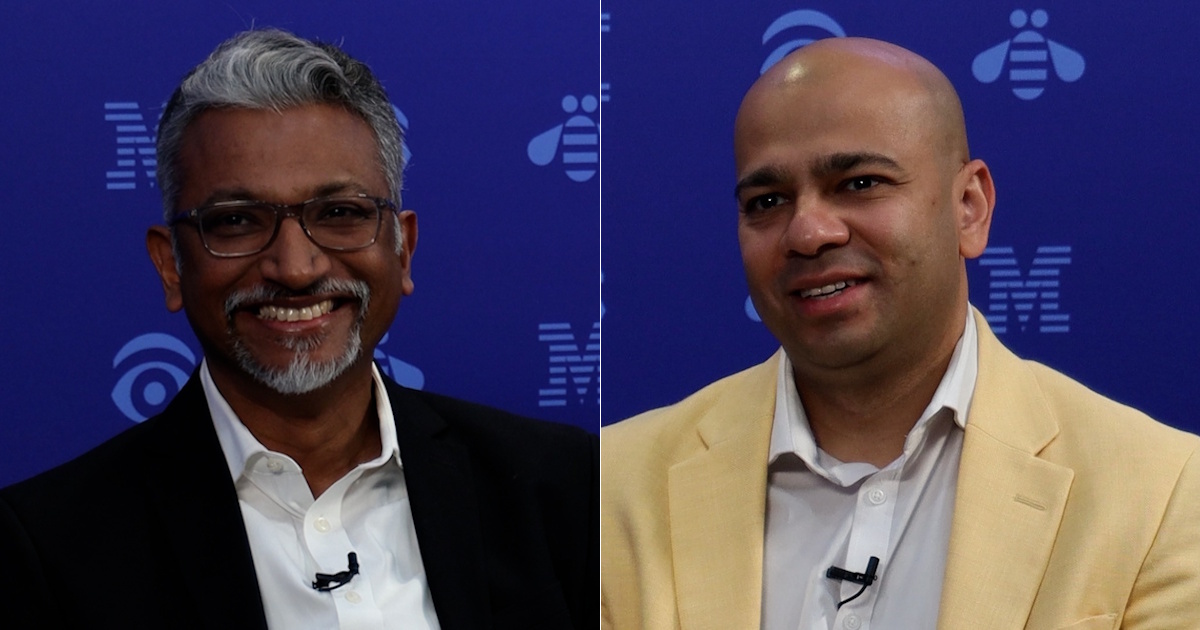 AI
AI
 AI
AI
 AI
AI
Enterprises are racing to apply generative artificial intelligence across customer experiences, operations and supply chains, but enterprise AI adoption isn’t easy. Turning innovation into real-world business value is proving far more difficult than expected.
PepsiCo Inc. is showing what it looks like when that ambition meets execution. The company has moved beyond pilots and prototypes to embed AI across functions, creating personalized customer journeys, automated procurement systems and next-generation supply chain models. That progress is rooted in a unified data and AI foundation built with IBM Corp., according to Magesh Bagavathi (pictured, left), senior vice president, global head of data, analytics and artificial intelligence at PepsiCo.
“This is a team sport, and that’s how we’ve come together as really one team to drive this,” Bagavathi said. “But the advantage that the team has is [that] it’s also how … we drive it for consumption as one team. But how do we also drive it as one team with centralized platform capabilities? That’s data platforms, AI platforms [and] cloud platforms, all operating at scale. IBM’s been a huge partner for us as we’ve expanded these kinds of platform capabilities.”
Bagavathi and Shobhit Varshney (right), head of data and artificial intelligence, vice president and senior partner at IBM., spoke with theCUBE Research’s Dave Vellante at IBM Think, during an exclusive broadcast on theCUBE, SiliconANGLE Media’s livestreaming studio. They discussed how PepsiCo moved from siloed systems to a platform-based data strategy and what it takes to achieve measurable business outcomes with enterprise AI. (* Disclosure below.)
PepsiCo’s enterprise AI adoption didn’t start with flashy use cases: It started with architecture. Facing fragmented data spread across legacy warehouses, puddles and silos, the company invested in a single modern lakehouse with a medallion structure and governance built in from the start. Creating “golden” key performance indicators, standard reports and consistent consumption frameworks was critical to scaling AI across global teams, according to Bagavathi.
“Where we’re going to [is] a modern data lake platform … [but] then how do you make sure that the gold data is truly pristine to be used for your analytical and your AI apps?” he said. “In that framework, we also have governance, cataloging, lineage management and the ability for us to really synthesize the relationships.”
IBM helped PepsiCo transform that foundation into a composable enterprise data fabric, integrating operational technology with decision intelligence. This work included migrating and organizing on-prem data, optimizing usage patterns with AI and accelerating time to value through automation. Rather than relying on generic models, the approach contextualized enterprise knowledge to deliver more accurate insights, according to Varshney.
“If you have a seller in Texas who says … ‘Give me sales for Paris,’ we know that the context is that the seller has access to only Texas territory, hence we’re talking about Paris, Texas,” Varshney said. “Bringing in that context to improve the accuracy of data is amazing.”
That shift to context-rich data — and scalable enterprise AI adoption — was driven by top-down support, funding and relentless focus on prioritization, according to Bagavathi. PepsiCo’s executive leadership mandated a unified data and AI platform, backing it with 2,000 staff and partners. The team decommissioned underperforming tools, aligned around 28 high-value initiatives and unlocked tangible wins, especially in financial forecasting and integrated business planning.
“If you really want to make yourself a data and AI company, you have focused attention on the priorities, you put money behind it, and … you have one foundation, what we call an EDF, enterprise data foundation,” Bagavathi said. “Then you start seeing the value unlock … wins in Turkey, in France. We started seeing wins in many markets. Automatically, we started seeing the population and the convergence. You’ve got to see wins.”
Here’s the complete video interview, part of SiliconANGLE’s and theCUBE’s coverage of IBM Think:
(* Disclosure: TheCUBE is a paid media partner for IBM Think. Neither IBM Corp., the sponsor of theCUBE’s event coverage, nor other sponsors have editorial control over content on theCUBE or SiliconANGLE.)
Support our mission to keep content open and free by engaging with theCUBE community. Join theCUBE’s Alumni Trust Network, where technology leaders connect, share intelligence and create opportunities.
Founded by tech visionaries John Furrier and Dave Vellante, SiliconANGLE Media has built a dynamic ecosystem of industry-leading digital media brands that reach 15+ million elite tech professionals. Our new proprietary theCUBE AI Video Cloud is breaking ground in audience interaction, leveraging theCUBEai.com neural network to help technology companies make data-driven decisions and stay at the forefront of industry conversations.